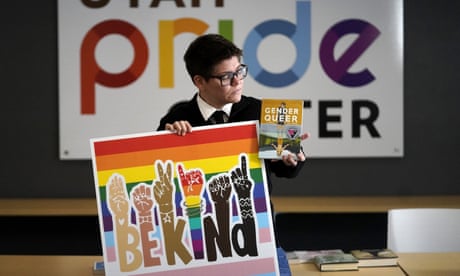- by foxnews
- 04 Mar 2025
‘A streak of extremism’: US book bans may increase in 2023
‘A streak of extremism’: US book bans may increase in 2023
- by theguardian
- 25 Dec 2022
- in news

Book bans have plagued many US schools throughout 2022, with stories focusing on LGBTQ+ and race issues being targeted by conservatives across the country, and the right aims only to step up its attempts at censorship in the new year, experts warn.
States including Missouri and Utah have seen intensifying crackdowns in recent months, with some Utah school libraries now requiring permission slips for students to borrow books covering LGBTQ+ themes. Elsewhere the convincing re-elections of Republican governors in Florida and Texas, which have some of the most restrictive laws around education, mean that change is unlikely there in the short term.
There is hope, however, with many educators, librarians and activists fighting back against book bans and winning some key victories in 2022. But restrictions have surged through the US in recent years. Through the first eight months of 2022, there were 681 attempts to ban or restrict library resources, targeting 1,651 different books, according to the American Library Association.
Books about, or by, LGBTQ+ persons or people of color have been disproportionately targeted by rightwing activists, who frequently have links to deep-pocketed Republican donors. Hundreds of thousands of dollars have been spent on school board elections - traditionally small-scale affairs - in Texas alone, the New York Times reported in mid-December.
Texas and Florida have led the charge. Florida, whose recently re-elected governor, Ron DeSantis, signed into law the so-called "don't say gay" bill earlier this year, has 566 book bans in place across school districts, second only to Texas, where the Republican legislature has also supported bills which enable censorship in schools.
Between July 2021 and June 2022, 801 books were banned across 22 Texas school districts in Texas, Texas Monthly reported in November.
"I don't expect this to be waning," said Jonathan Friedman, director of free expression and education programs at Pen America, which champions freedom of writing and speech worldwide.
"In many parts of the country, there is a kind of streak of extremism that is continuing to ramp up."
Recent examples of that have been seen starkly in Missouri and Utah, both of which have Republican legislatures.
Between August and November Missouri banned nearly 300 books in at least 11 school districts, according to Pen America.
The restrictions came after Missouri passed a new law, SB 775, which banned providing "explicit sexual material" to elementary or secondary school students, including by assigning certain texts as homework or loaning them out of libraries. The legislation saw school districts remove works about Leonardo da Vinci and Michelangelo; visual depictions of Shakespeare's works; and Maus, the Pulitzer-prize winning graphic novel about the Holocaust, which was banned from some schools in Tennessee in January 2022.
As elsewhere, books which reference or are written by LGBTQ+ people or non-white people were targeted in Missouri, and in December the state's ACLU filed a lawsuit against one school district after it removed the novel Cats vs Robots #1: This is War by Lewis Peterson and Margaret Stohl, a book about a space war between cats and robots which briefly references non-binary gender identity, from some school libraries.
"Across the state, from school boards to lawmakers and other officials, we have seen a coordinated effort by the government to censor books in both school and public libraries, especially those authored by and featuring the perspectives of people and communities of color, LGBTQ+, and other marginalized groups," Gillian Wilcox, deputy director for litigation at the ACLU of Missouri, said in a statement.
A different tactic has been seen in a school district in Alpine, Utah. Friedman said earlier this year the district ruled that students would need parent or guardian permission slips to borrow any of 17 books, many relating to the LGBTQ+ experience. The books include titles such as Queer: The Ultimate LGBTQ Guide for Teens, and The Nowhere Girls, which addresses rape and sexist culture.
In a bleak period, there have been some victories for people who oppose censorship. In Texas, the Round Rock Black Parents Association successfully campaigned for the book Stamped (For Kids): Racism, Antiracism, and You - a history of racism in the US by the Black authors Jason Reynolds and Ibram X Kendi - to remain on the shelves, after it faced a ban.
Hundreds of parents and anti-censorship activists campaigned in New Jersey to keep a series of books addressing LGBTQ+ experiences, including Gender Queer by Maia Kobabe and Lawn Boy by Jonathan Evison, in school libraries.
But people opposing bans or proposed bans frequently come up against formidable foes. Censorship in states across the US has frequently been pushed by conservative groups linked to deep-pocketed rightwing donors. Groups like Moms for Liberty and Parents Defending Education have been instrumental in book-banning attempts in the US, often presenting themselves as small, "grassroots" efforts, while in reality they have links to prominent, wealthy Republicans.
"There is a degree of organization and coordination behind this," Friedman said. "That is the only thing that can explain why it looks so similar in so many places, and why it has spread so quickly," he added, noting also that some political candidates will write to numerous school districts.
Recent efforts have expanded to conservatives targeting publishers themselves. A proposed law in Texas would require publishers to put age restrictions on books sold to school districts.
For all the furor among the right wing, however, Friedman pointed out it appears it is rare for the vocal pro-censorship people to have read the books themselves. Lists of offending books circulate among rightwing groups, and frequently conservatives will pluck titles and complain to school boards, while those complaints demonstrate a lack of familiarity with the works.
"Watching this for a year, I would venture that a huge number of the bans we've seen would not have happened if school districts insisted that people filing petitions spelled authors' names and book titles correctly," Friedman said.
He concluded: "If [the school boards] just said: 'You can't submit a form with spelling errors,' it would make a big difference."
- by foxnews
- descember 09, 2016
Bus travel sees 'steady growth' as flyers seek alternative transportation
People who ride on airplanes might rely on alternative transportation for a number of reasons. A CEO of a bus travel company shares insights with Fox News Digital.
read more


